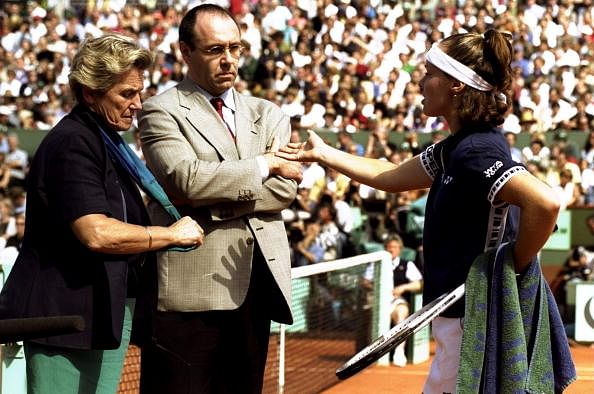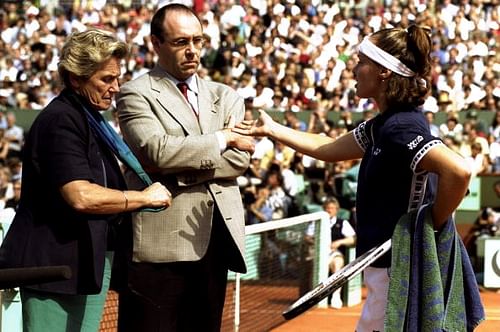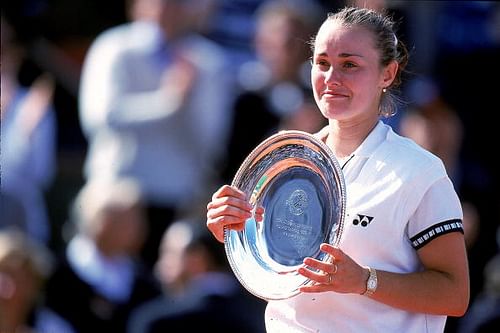
Memorable French Open Moments: Hingis - Graf, 1999

Over a sustained period of tennis-watching, there are some general motifs that subconsciously take root in a tennis fan’s mind. For example,
Prudence is unlikely to be the watchword for an 18-year old.
A champion in decline is still a worthy champion.
Never get on the wrong side of a French crowd.
Looking back, I know exactly where these particular lessons were imparted to me. Roland Garros, 1999, the French Open Ladies Singles Final between Martina Hingis and Steffi Graf.
The match had an interesting enough context to begin with. Graf, 30 years old and winner of 21 Grand Slams at that point, was in the twilight of her illustrious career. She was going into the match without a lot of expectations. Admittedly, the French Open was intended to be a nice warm-up exercise for her more realistic attempt for silverware at Wimbledon. She had surprised herself by even making it to the final.
Facing her on the other side of the net was the brilliant, cocky 18-year old Swiss Miss, Martina Hingis. Winner of 5 Grand Slams already, she had swept the tennis world over the last couple of years with her supreme court sense, shot selection and overall tennis nous. She was also building a reputation of speaking her mind, and had already labelled Graf a ‘spent force’ around a year earlier. The French Open was the only Major title missing in her collection, and the general perception was that it was a question of when, and not if. And even that question was bound to be answered today, most people felt.
Surrounding them was the inimitable French crowd at Court Philippe Chartrier. They were all packed in, looking forward to a good contest, and with a distinct bias towards Graf, thanks to the warmth and affection that is naturally accorded for any great champion executing her swansong.
The match began predictably enough. Hingis masterfully controlled the rallies, hit the lines with pinpoint accuracy, kept Graf on the backfoot throughout, and generally trotted around the court like a youngster who knew her time had come. The first set went her way 6-4, and when she broke to go up 2-0 in the second set as well, pundits and fans alike were preparing to accept the inevitable changing of the guard.
And then, one of Hingis’ deep forehands just missed the baseline. Graf gave it a quizzical glance and moved on. But Hingis did not. Standing at the net, she insisted the chair umpire inspect the mark. The umpire duly complied, but chose to stick to the original ruling. Convinced that the umpire was looking at the wrong mark, Hingis made her first wrong move of the day. She walked across to Graf’s side of the court to make her point. In a sport as stringently non-contact as tennis, this marked a taboo act she had committed, and the crowd knew it and murmured. Still unable to convince the chair umpire, a frustrated Hingis refused to play till the tournament referee personally reviewed the decision. In the midst of the rapidly increasing crescendo of boos and catcalls from the crowd, the referee made her way to the centre and promptly imposed a point penalty on Hingis for crossing over to the opponent’s side of the court. Hingis had lost more than just a point there; she had effectively started her downward slide.
Hingis continued for some time with a broad smile and an I-cant-believe-this-is-happening attitude, but she had quickly lost friends in the stadium. Every extra second’s glance she now gave to a shot landing anywhere close to the lines was greeted with a chorus of jeers and whistles. The crowd, already pro-Graf, was now a solid second opponent against Hingis. In the meanwhile, Graf had sensed her chance and was making an improbable comeback. Using all her experience and skills, she began stringing together a series of points patterned around delicately sliced drop-shots and expertly placed lobs. The second set careened exhilaratingly between the two players, but with the crowd lustily cheering Graf on, she eventually captured it 7-5.
Hingis tried to recoup at the beginning of the third set by taking an extended, and criticized, bathroom break, but it was to no avail. The momentum had now firmly swung in Graf’s favour, and there was no turning back. Towards the end of the match, with a heartbreaking loss looming large, Hingis resorted to the infamous underhand serve on two occasions. Unsurprisingly, the crowd was not impressed. As she paused for the deafening boos to die down to commence her service motion again, she lifted her face with closed eyes to the evening sun, waiting for a modicum of silence which would never come. The confidence of the young had never looked so fragile. A final attempt at discussion with the chair umpire to quell the raucous crowd fell on deaf ears, literally. And Fraulein Graf chose the moment to move things along with a curt, “Let’s play tennis, OK?”
It ended soon after that, with a final scoreline of 4-6, 7-5, 6-2. A quick handshake, and Hingis couldn’t wait to get off the court. As Graf was letting the surreal realization of an improbable win sink in, Hingis had to be convinced by her mother and then-coach Melanie Molitor, to make an appearance for the presentation ceremony. She reappeared, sobbing heavily in the arms of her mother, possibly the most recognizable public breakdown in a losing cause alongside Jana Novotna’s seeking out the Duchess’ shoulder at Wimbledon. To Hingis’ credit, she gathered herself sufficiently to make a short speech in an uncomfortable mix of French and English. To the crowd’s credit, they actually cheered her this time. And to Graf’s credit, she emphasised how Hingis was young and would have many more chances to win at Roland Garros.

Which was ironical, in hindsight. Neither woman would win a Grand Slam tournament again. Graf decided this was the best possible way to end at Roland Garros, and never played the French Open again. Hingis made it to a couple of further semi-finals, but never came as close to claiming the one missing Major in her collection. As she recounted even recently, the one regret she has in her playing career was the lack of French Open success. While she might regret her own impetuousness in that match, Graf might have been the most accurate in summing up the experience of that day. “It was one of the craziest matches ever. It had everything.”